“The CVS of [Afro-Caribbean]
Religion[s]”*: Botánicas in Worcester, Misconceptions and
Realities
Coauthors: Ahmed Abdelgadir, Crystal
Almanzar, Michelle Cuddy, Brittany French, William Landergan, Julia Maki,
Maureen McKeon, Joanna Mergeche, Emilia Salamán, John
Sluker
Advisor: Professor Rosa Carrasquillo
We dedicate this paper to Professor William
Meinhofer, who supported this project from its inception.
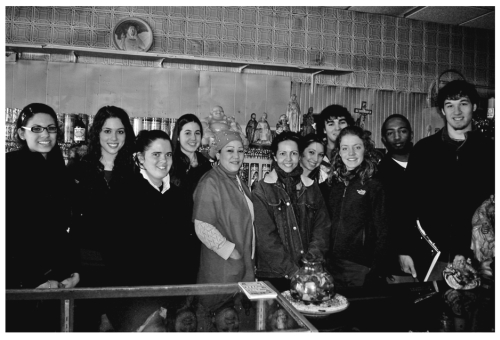
María Tejeda and Afro-Latin America
History Class at Botánica San Miguel
(photo by Rosa
Carrasquillo)
Introduction
In the United
States, the Latino population is the fastest growing minority group. According
to the 2000 Census, Latinos represented 13.3% of the U.S.
population.1 The Latino population in Worcester is consistent with
the national figures, reported as 15.15% of the city's population in 2000.
Historically, Latinos from the Caribbean, mostly of African descent, settled in
New England. Puerto Ricans, Cubans, and recently Dominicans dominate the
demographics.2 Afro-Caribbean people in New England influence the
communities they settle in, bringing their culture and religions and
establishing businesses of all types.
One of the first
Latino businesses in many New England communities is the botánica which
is an ethnic healing stores that serve Afro-Caribbean religions, especially
Santería and Espiritismo. These religions are often seen as taboo or
primitive or completely unknown to the U.S. public. Historically, these
religions and botánicas have served as “quintessential cultural
mélanges” that with an increasing Latino population in the city
have become increasingly present.3 New York City has 147
botánicas, a sharp contrast to the two botánicas currently open
in Worcester. While the earliest origins of botánicas in New York City
have been traced to the 1900's,4 the first botánica in
Worcester did not open until 1973,5 and their presence has not
developed in a similar manner. This article addresses the contrast by tackling
three main goals: (1) To understand the role of botánicas in Worcester
in comparison to the successful picture of New York City. Why are there only
two botánicas in Worcester when there is a large percentage of Latinos?
(2) To estimate the cultural significance of botánicas in the larger
community, what is the role of botánicas in Worcester? and (3) To
collaborate with the College of the Holy Cross's efforts to improve relations
with the Worcester community. Using personal interviews and participant
observation, data was collected regarding healers and their botánicas in
Worcester, Massachusetts.
Background
Santería or
Espiritismo are part of the African Diaspora to the Americas and have a rich
history. Santería comes from the Yoruba, an ethnic group originating in
Nigeria. The Yoruba believe in many deities (orishas) which like Roman or Greek
gods, have human-like qualities, including flaws and strengths. The purpose of
the religion is to facilitate communication between orishas and humans in order
to establish physical and spiritual balance. In the Americas, these Yoruba
beliefs were masked with multiple aspects of Catholicism, providing a safe form
of experiencing Yoruba religion within the Church.6
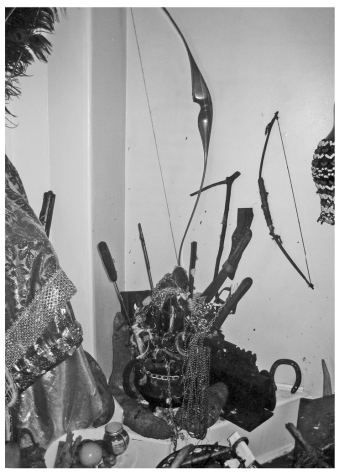
Shrine to Ogún at Steve Quintana's
house, showing the orisha's
connection to metal and weaponry.
(photo by
Maureen McKeon)
Likewise, the
Catholic Church did not approve of Espiritismo, the Caribbean rework of Allan
Kardec's belief system. In the nineteenth century, Europe and the United States
began to experiment with Spiritism, the ability to speak with the dead through
various methods like levitations and table rappings. When Spiritism was
introduced in the Spanish Caribbean, many freethinkers adopted it to express
their discontent with colonial governments. Rapidly, people of African descent,
who found this religion particularly appealing, adopted Spiritism. Affirming
important aspects of Afro-Caribbean worldview, Spiritism offered “new
methods” to communicate with spirits. To facilitate this community an
espiritista, a religious leader, translates what ever the spirits advice in
order to resolve any human infliction.7
Both Santeria an
Espiritista are represented in the botánicas of Worcester. Frank
Rosario, a santero from Puerto Rico, came to the United States when he was
eighteen. He has been in contact with the spiritual world since his youth and
in June 2006 opened Botánica Las Mercedes on Pleasant Street as a result
of a calling he received from the orisha, Obatalá.8
María Tejeda, an Espiritista from the Dominican Republic, and owner of
the Botánica San Miguel, located on Chandler Street, is named for the
saint she associates herself with.9 Ms. Tejeda realized she had the
ability to communicate with the spirits at the age of seven and afterwards, was
instructed by her aunt in the spiritual realm.
The Calling
Each
botánica owner has a unique life-long spiritual calling. Ms. Tejeda
expressed her calling to be a selfless and helpful support system for the
Worcester community. Intending to spend only two months in Worcester, she came
and felt as though someone needed to attend to the problems of Latinos. After
spending ten years in the city, she is content with her influence in the
community. She remarked that she serves as a source of strength and refuge for
those who need support, and also emphasized the beauty and goodness of
Espiritismo.10 Likewise, Mr. Rosario professed a desire to open a
botánica since his youth. He feels that it is his responsibility to
serve as an intermediary between the people and their spirits.11
These
botánicas provide a variety of services for their clientele. On
location, the botánica owners sell an array of perfumes, oils, candles,
statues, cards, mats, and other products. The owners themselves administer
several healing rituals. Botánicas affiliated with Santería, such
as Botánica Las Mercedes, offer consultations, divinatory methods such
as card and shell readings, spiritual masses, community gatherings, and other
spiritual ceremonies. Botánicas affiliated with Espiritismo, like
Botánica San Miguel, also offer consultations, card readings, and
similar healing rituals. Most consultations take place at the botánica
but some of the rituals are held at the homes of the clients. The purposes
underlying these rituals vary from physical healing to spiritual cleansing. In
the process of performing these rituals, the Santeros and Espiritistas
communicate with the spiritual beings to discern the problems at hand. Mr.
Rosario explained that the ceremonies and rituals they perform are meant to
protect the individual, and never to inflict harm upon others. Mr. Rosario
added that because spirits have the potential to damage us, it is important to
conduct practices that will protect ourselves, and this protection is achieved
without harming other people. Occasionally, the botánica owners are
confronted with physical ailments beyond their healing capabilities and
consequently, they must refer their clients to medical
practitioners.12
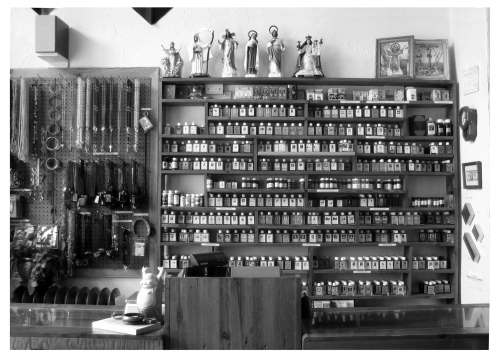
Prayer candles, perfumes, statuettes of
saints and rosary beads for sale at
Botánica Las Mercedes.
(photo
by Maureen McKeon)
Botánica
owners in Worcester serve as a complimentary component to their surrounding
communities. The Santeros and Espiritistas feel that they have an innate duty
to serve the needs of the community and perceive their efforts and religions to
be truly beneficial for the public. Studies conducted by Sara Trillo-Adams,
director of the Latino Mental Health Project of Worcester, have shown that
Latino populations tend to receive unsatisfactory mental health
services.13 In order to fulfill their responsibilities to the
communities, Santeros and Espiritistas establish botánicas to offer an
alternative to traditional mental health services and provide clients with the
aid they need. As Mr. Quintana remarked, botánicas are the “CVS of
the religion,” offering complimentary mental and physical health services
to Latinos.14 Mr. Quintana and Mr. Rosario, as practicing Santeros,
and Ms. Tejeda, as a practicing Espiritista, came to the United States with
personal aspirations of providing an outlet for individuals in need.
Body, Mind, and Spirit
Although
Afro-Caribbean religions typically attract people of Latino background,
botánica owners provide services to clients from diverse backgrounds
including both Anglo-Americans and African-Americans. Generally these clients
reside in close proximity to the botánica but owners service clients
from all over the United States and even the Caribbean. On average the
botánica owners deal with anywhere between five to ten clients per week,
the majority of which are women.15 Many of the clients are regulars
especially when the botánica has been in business in one area over a
long period. The clientele tend to be older than eighteen, but according to Ms.
Tejeda, clients can be as young as eight years of age.16 People
consult the owners of these botánicas with various issues including
physical problems, seeking spiritual guidance, personal issues, including job
troubles, drug abuse, difficulties in love, and numerous psychological issues.
The fact that
Latinos visit the botánicas for consultation with regards to
psychological issues indicates that they are not receiving adequate mental
health services.17 In fact, responding the early 2000s budget
crisis, Massachusetts “has severely curtailed access services on the part
of immigrants, including legal immigrants.” As a result, “immigrants
became ineligible for federal programs such as health services (including
mental health services), income support, or emergency
services.”18 In 2001, the US Surgeon General reported that
Hispanics and Latinos were one of four groups in the United States that were
receiving inadequate mental health services. To help address this problem in
Worcester, the Latino Mental Health Project was developed. The project began in
2002, and it was designed to be “A collaborative to improve access to
mental health services in the Latino community of Worcester.”19
The Project attempted to find information on Latino's mental health needs,
locate barriers to seeking treatment, and draw information about their
experiences with professional mental health services.20
The findings of
the Project explain why many Latinos have faced problems with mental health
services and receiving appropriate treatment. Eighty-six percent of the
participants in the interviews reported that they or a family member had
experienced a mental health related problem. Many of the conditions that were
reported are understood and accepted by the Latino community, but mainstream
American psychologists and doctors look them at differently. Any belief in the
spirits was diagnosed by professionals as some type of psychosis and was
treated with high doses of medication. Therefore it is not surprising that
twenty percent of participants in the project said they had felt disrespected
when seeking treatment. Another twenty-two percent said they felt negative
effects from medicine that was prescribed to them. The study recognizes that
Latinos do not feel comfortable seeking treatment that requires the use of
modern medicine, which is often ineffective for their specific conditions.
Because of cultural barriers, as well as a lack of health insurance and
language differences, the status of health services in the Latino community is
inadequate. One of the many reasons that Latinos visit botánicas is to
supplement or replace modern mental health services that have not been
successful in addressing the needs of the Latino population.21
The Mental Health
Project also found that a total of fourteen percent of the 166 interviewees
admitted to seeking alternative care for these mental-health related problems
from a Santero or Espiritista.22 About fifty percent of the
interviewees were Puerto Rican and a larger majority was Christian. Many
interviewees may have sought out alternative services but did not admit to it
because they were afraid of being wrongly judged, perceived as uneducated, or
were embarrassed.23
Although some
clients may lack faith in professional medicine, the owners of botánicas
do not hesitate to outsource or recommend that clients seek professional
treatment. The owners usually recommend visits to medical doctors as part of
their consultation, and often will use a doctor's diagnosis to pinpoint where
certain sicknesses are concentrated.24 Ms. Tejeda admitted that
there are certain problems, more specifically physical problems, which she is
not able to cure and consequently recommends that clients with these problems
see a doctor. Currently there are programs, one of which conducted by Boston
University Medical School, which informs doctors about Afro-Caribbean religions
and how to integrate some of the herbal medicines and traditions into modern
professional practice.25 Although the integration between the
Afro-Caribbean religious practices and professional medicine is beginning to
spread, Worcester is still in the early stages.
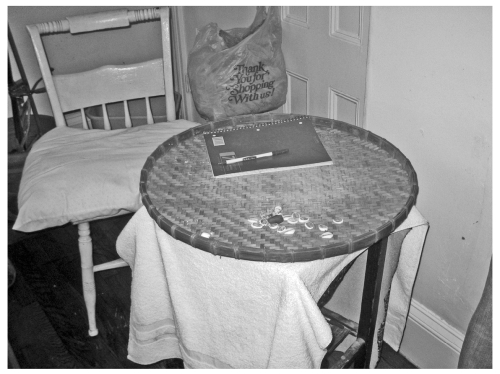
The table on which Steve Quintana performs
shell (caracol) readings for clients. The red notebook is used to document each
reading, so that it can be used to help decipher future readings.
(photo by
Maureen McKeon)
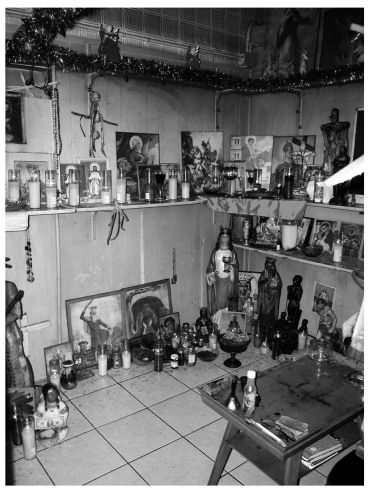
The table in the consultation room where
María Tejeda gives readings
- the deck of cards are tarot cards she
uses for consultations, and below
are the notebooks she uses to record all
of her clients readings
(photo by Rosa Carrasquillo)
Through Community Eyes
While Worcester
boasts a sizeable Latino population, it is currently home to only two
botánicas. There are a total of five listed in the public phone
directory, but only Botánica San Miguel and Botánica Las Mercedes
are still open for business.26 It is surprising that so few of these
religious businesses have succeeded in a city that has such a high
concentration of Latinos, especially those from Caribbean countries, such as
the Dominican Republic and Puerto Rico. When a comparison is made between the
147 botánicas of New York City, observed in the boroughs of Manhattan,
Brooklyn, and parts of Queens, and the two surviving stores in Worcester, many
questions are brought to the forefront.27 The most prominent query
that surfaces is why it has been so difficult for botánicas to remain
operational in the city of Worcester.
While he success
and influence of botánicas in Worcester seem to be struggling, the nes
in Dorcester are striving. Steve Quintana, a renowned Santero in Dorchester,
uses his house as a center for many religious gatherings. This could present
neighborhood problems, due to the amount of people and the noise level involved
in their ceremonies (many times the batá, a sacred drum set used in
Santería, is played loudly); however, Mr. Quintana boasts that he has
never had encountered negative reactions from the immediate
neighborhood.28
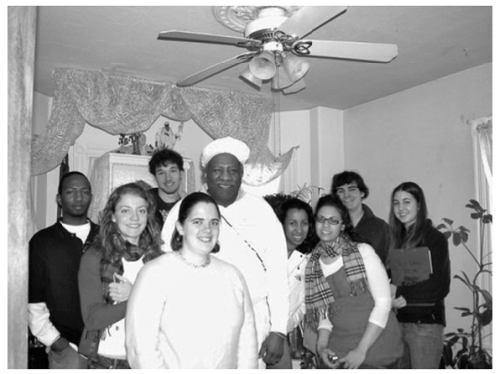
Afro-Latin America class at Steve
Quintana's house.
(photo by Rosa Carrasquillo)
In describing the
role of his botánica in the community, named The House of Mother Nature,
he stated that it was akin to a bodega, a small neighborhood marketplace, but
for religious healing products. He imports many of his herbal products from
Peru, Chile and various Caribbean countries because they cannot be found in the
United States; other products he finds domestically. In his opinion, the most
challenging aspect of owning a botánica is managing the inventory of the
store - he cannot display 15-20% of his products because there is not enough
space in his store. Until recently, the store was located in Jamaica Plain,
Boston, but due to the rising cost of rent, Mr. Quintana was forced to move the
store to 357 Washington Street in Brighton, Massachusetts. The relocation has
been difficult because the Latino community is distanced from the store. He
still believes, however, that curently it is easier to open and maintain a
botánica in the Boston area than it was when he first opened in 1990.
There are ten operational botánicas in Boston, compared with the
existence of only two when he started out.29 Despite the long-term
success of Mr. Quintana's botánica, he has felt the pressures of the
small business economy in Boston. This low rate of success by small businesses
is felt statewide, and is therefore applicable to the Worcester economy.
When looking at
one of only two botánicas in Worcester, Botánica Las Mercedes,
Mr. Rosario provided an in depth portrayal of the struggle associated with
operating such a store in the city. He emigrated from Puerto Rico nineteen
years ago and opened his first botánica in June of 2006. For the most
part he feels the people of Worcester have welcomed him, and he has earned
their appreciation and respect.30
When members of
the community were asked to comment on the existence of Botánica Las
Mercedes, a variety of views surfaced. On Pleasant Street, a few storefronts up
the road, is an African American clothing store. When asked about the existence
of its neighboring botánica, the clerk was extremely unwilling to
divulge any feelings concerning it. He stated that he did not want to comment
on someone else's store and somewhat hurried the interviewers out of his
establishment. This silence seems to be highly indicative of the mystique that
often surrounds these religious stores.31
Across the street
from Botánica Las Mercedes, at 10 Irving Street, is All Saints Church.
The ministry coordinator of the church, Sally Talbot, stated that she was aware
of the botánica but was unfamiliar with its exact purpose.32
Ms. Talbot works in the opposite direction of the store and therefore does not
have any day-to-day interaction with it. Because of this she and many of the
other members of the All Saints Church have become oblivious to people coming
and going. She highlights the fact that the neighborhood is one of mixed income
and diversity and the turnover of storefronts is tremendous, especially the
businesses that have occupied where Botánica Las Mercedes is currently
located; there is little parking near the businesses, making it unattractive to
potential customers.
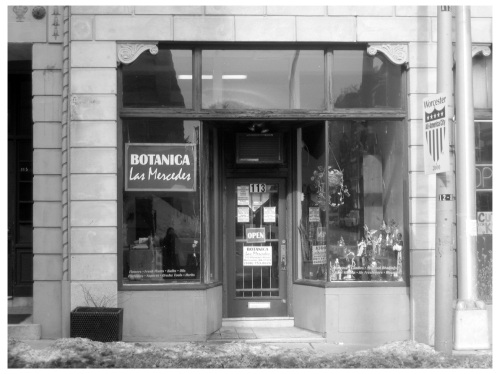
Storefront of Botánica Las
Mercedes
(photo by Maureen McKeon)
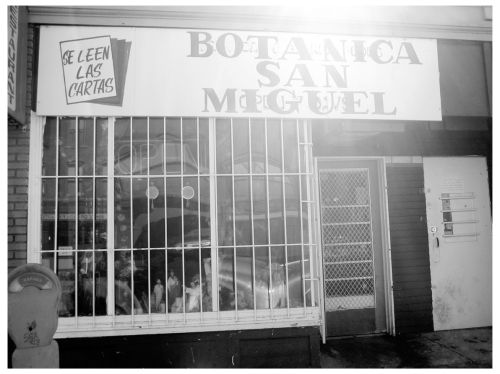
Storefront of Botánica San
Miguel.
(photo by Maureen McKeon)
Bordering
Botánica Las Mercedes on the left is Freddy G's Hair Salon. When asked
about his knowledge of the neighboring store Freddy G explained that he had
never bought anything from them, but sometimes interacted with the store if he
needed change. He also mentioned some common misconceptions of the store,
saying it was involved in voodoo and witchcraft. Overall, however, Freddy G had
no problems with the Botánica Las Mercedes.33
As opposed to
Botánica Las Mercedes, Botánica San Miguel, located on Chandler
Street, has been in business an astonishingly long time considering the
transience of many other businesses in the area. After immigrating to the
United States with the intention of staying for a mere two months, Ms. Tejeda
felt that it was necessary for her to stay and aid the people of Worcester. She
believed there was an immediate need for her in the area and thus established
Botánica San Miguel. Being open for so long, Ms. Tejeda has seen other
botánicas come and go, sometimes even losing customers to new
competition. Still, she is reassured of her status due to the return of many
customers after realizing that her work “is real and of higher quality
than many other places.” Ms. Tejeda boasts of good neighborhood reception
with little to no involvement with the police, neighbors, or violence. To her,
this highlights the fact that she is doing a good job in her religious vocation
by contributing positively to the community. Ms. Tejeda also reiterates that
her line of work is a calling and that money is not important. Her only goal is
to truly help the members of the community who seek her
assistance.34
Adjacent to the
botánica is a Spanish-American restaurant, called El Sazón
Latino, which serves a variety of Hispanic foods; Spanish is mainly spoken at
the establishment. A server, named María, from the Dominican Republic,
was generous enough to comment about her knowledge and opinion of the
botánica. She was fully aware of the existence and intent of the
botánica - that it sold candles, other religious items, as well as
provided spiritual services. She has never received a consultation, but has
entered to purchase various items, such as candles and incense. When asked to
comment on her view of the botánica, she stressed that Ms. Tejeda has
always worked to strengthen the community.35
Further down at
140 Chandler Street resides Edward's Economy Paint Supply. Upon entering the
business, the receptionist, Carol, and older, white woman did not express any
knowledge of the existence of the botánica. She stated that she entered
and exited the paint supply store in a way that rarely took her past the
botánica, so she had not noticed it.36 Her co-worker, Henry,
an older, white man, however, expressed ample knowledge about the
botánica and its perception by the community.37 He is aware
that it exists - on one occasion he entered to buy scented candles to make his
house smell nice, in addition to wanting to “help out a fellow Worcester
neighbor” with his patronage. Henry states that the botánica is a
religious store, but that it practices “their type of religion.” He
explains his view that religion depends on how you are brought up, and admits
that the religion practiced in the botánica seems much more intense and
devout than his religion. Even though he knows that the botánica does
not partake in any illegal activity, he hears people say that they think it is
a drug place - more specifically, a place where marijuana is sold. In his
opinion, the Chandler Street neighborhood causes the botánica to be
associated with such things; he explains that if Botánica San Miguel
were located in the Solomon Pond Mall, people would probably be impressed with
how great the store is. When the social marginalization of community perception
is then added to the already troublesome economic situation that faces the
botánicas in Worcester, it becomes exponentially more difficult for
these businesses to survive.
In his inaugural
speech, Governor Deval Patrick recognizes that there exists a, “…
state wide problem that it is extremely difficult for small businesses to stay
afloat after opening.” As a consequence, he vows to stay true to his
campaign platform and create state wide programs that will, “recognize
that most new jobs are created in small businesses, and that we want small
businesses to make it in Massachusetts, too.”38 Governor
Patrick’s concerns are exemplified through the botánicas in the
Worcester community: there are currently five botánicas listed in the
2007 Worcester phone book, although only Botánica San Miguel and
Botánica Las Mercedes are the only businesses that are actually
functioning. For example, Botánica La Milagrosa is listed at 271 Lincoln
Street in the phone book; in a very short period of time – between the
publication of the phone book and February 27, 2007 – this botánica
has already gone out of business and “Allure Barber Shop” has
replaced it.
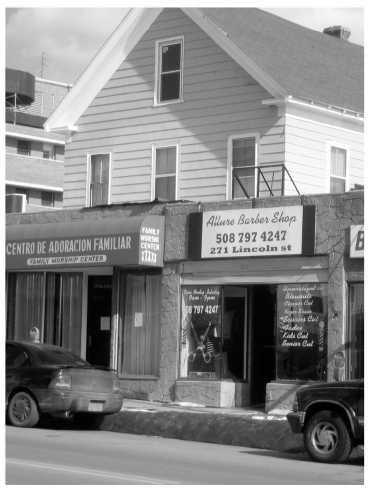
Storefront of Allure Barbershop, which now
occupies the former
location of Botánica La Milagrosa
(photo by
Maureen McKeon)
Summary of Results
Botánicas
in Worcester offer the same services as botánicas in New York City, but
because of economic factors, it is more challenging to open a botánica
in Worcester than in New York City. Like Anhai Viladrich found in New York, the
role of botánicas in Worcester is complementary to modern
medicine.39 While they are often able to address their physical,
spiritual and psychological problems through the services of to
botánica, practitioners will turn to mainstream professional care
physical ailments requiring surgery or serious treatment, particularly when
recommended in a spiritual consultation. In addition, the botánicas
provide a place of cultural validation and a resource to build community.
Although the
botánica owners were initially hesitant to participate in this project,
the interviews conducted have opened a dialogue between the College of the Holy
Cross and these religious practitioners, and all individuals interviewed
extended an open invitation to return to their stores. The Worcester community
will benefit though Sara Trillo-Adams, Director of the Latino Mental Health
Project of Worcester, who hopes to provide Latinos with other mental health
alternatives by referring to this article.
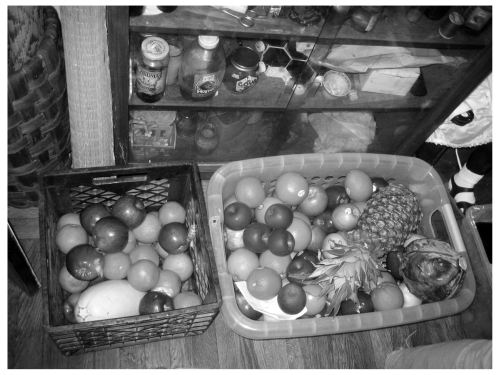
In the baskets there are apples, oranges,
pineapples, cabbages, squash, and lemons
used as offerings to the orishas
in religious community gatherings
at Steve Quintana's house.
(photo by
Maureen McKeon)
Notes
| 1 |
Yoel Camayd-Freixas, Gerald
Karush and Nelly Lejter, “Latinos in New Hampshire: Enclaves, Diasporas,
and an Emerging Middle Class,” in Torres, A. (ed.) (2006). Latinos in
New England. Philadelphia: Temple University Press, 2006, 171-186,
172. |
| 2 |
Camayd-Freixas, Karush and
Lejter, “Latinos in New Hampshire,” 176. |
| 3, 4 |
Viladrich, A. “Beyond the
Supernatural: Latino Healers Treating Latino Immigrants in NYC,”
Journal of Latino/Latin American Studies, 2 (1) (2006): 134-147, |
| 5 |
Crystal Almanzar, Phone
Conversation with Wanda Vega. |
| 6, 7 |
Olmos, Margarite Fernandez and
Lizabeth Paravisini-Gebert, Creole Religions of the Caribbean: An
Introduction from Vodou and Santeria to Obeah and Espiritismo, New York
University Press, 2003, 171-210. |
| 8 |
Interview with Frank Rosario,
February 22, 2007, Worcester, MA. |
| 9, 10 |
Interview with Maria Tejeda,
February 24, 2007, Worcester, MA. |
| 11, 12 |
Interview with Frank Rosario,
February 22, 2007, Worcester, MA. |
| 13 |
Sara Trillo-Adams. “Latino
Mental Health Project.” Public Presentation. College of the Holy Cross.
February 20, 2007. |
| 14 |
Interview with Steve Quintana,
February 17, 2007, Dorchester, MA. |
| 15, 16 |
Interview with Maria Tejeda,
February 24, 2007, Worcester, MA. |
| 17 |
Sara Trillo-Adams. |
| 18 |
Miren Uriarte, Phillip J.
Granberry, and Megan Holloran, “Immigration Status, Employment, and
Eligibility for Public Benefits among Latin American Immigrants in
Massachusetts,” in Torres (ed), Latinos, 53-78, 68. |
| 19 - 23 |
Sara Trillo-Adams. |
| 24 |
Interview with Frank Rosario,
October 22, 2007, Worcester, MA. |
| 25 |
Sara Trillo-Adams. |
| 26 |
Yellow Book: Greater
Worcester, 2006-2007, Business Alphabetical Listings, 20. |
| 27 |
Viladrich, " Beyond the
Supernatural," 158. |
| 28, 29 |
Interview with Steven Quintana,
February 17, 2007, Dorchester, MA. |
| 30 |
Interview with Frank Rosario,
February 22, 2007, Worcester, MA. |
| 31 |
Maureen McKeon, personal
conversation, 27 February 2007. |
| 32, 33 |
Brittany French and Maureen
McKeon, personal conversation, 26 February 2007. |
| 34 |
Interview with Maria Tejeda,
February 24, 2007, Worcester, MA |
| 35 - 37 |
Maureen McKeon, personal
conversation, 27 February 2007. |
| 38 |
“Text
of Governor Deval Patrick's Speech”, Boston.com Local News, 27
February 2007. |
| 39 |
Viladrich, A. “Beyond the
Supernatural: Latino Healers Treating Latino Immigrants in NYC,”
Journal of Latino/ Latin American Studies, 2(1) (2006): 134-147,
158. |
|